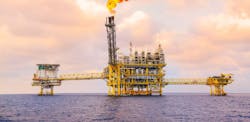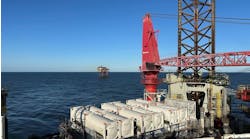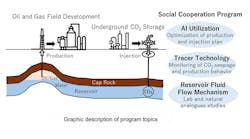Editor's note: This article first appeared in the 2023 Executive Perspectives Special Report, which published within the November/December 2023 issue of Offshore magazine.
By Ryan Bogner and Elena Anderson, Ernst & Young LLP
Decarbonization is essential for the viability, resilience and competitiveness of oil and gas companies in a rapidly evolving energy landscape. In this new reality, there are three inconvenient truths: decarbonization is challenging; decarbonization must happen faster; and decarbonization must balance access to energy production, energy affordability and climate targets.
Market dynamics surrounding decarbonization are leading to further differentiation of oil and gas products, not just on a cost basis but on a modified cost basis that accounts for embedded carbon. Some counterparties are already willing to pay a premium above the cost of carbon for differentiated products. This trend will only increase in value as pressure builds to meet ambitious climate targets. Currently, depth of market for these types of differentiated products makes it difficult to scale, but as additional regulations and carbon taxes come online, an additional depth of market is expected to emerge.
To create value from emissions, companies need to be able to go beyond annual sustainability reporting and traditional life-cycle assessments (which have historically been scientific studies based on snapshots of a moment in time or mean case) or even carbon reporting with external scopes 1 and 2 assurance. Instead, companies will need to be able to quantify, attribute and contextualize emissions on an asset, project or rig basis. This data will enable real-time identification of areas of improvement and operational intervention.
Offshore oil and gas production has innate advantages and disadvantages from a carbon emissions and climate change perspective. Offshore production is more vulnerable to extreme weather events that can damage or destroy infrastructure, leading to either spills or gas releases. Due to the distance from the shoreline, these can take longer to mitigate and result in overall higher carbon impacts as compared to emission events onshore. However, offshore production assets can help companies meet their ambitious climate targets as they offer:
- High-quality product: Offshore plays produce high-quality oil that is lighter and sweeter and, therefore, is easier to process and refine. The easier the product is to process and refine, the lower the carbon emissions are through the product life cycle.
- Fewer leaks: Offshore oil production is much more centralized and does not require multiple facilities for extraction, production, separation and compression that are separated by hundreds of miles for onshore production. The centralized nature of offshore production requires leaks to be addressed more quickly and therefore reduces carbon emissions from leaks.
- Carbon capture and storage (CCS) potential: Offshore platforms can facilitate the implementation of CCS technology. CCS can support the decarbonization of an asset by capturing and storing CO2 underground. Offshore facilities can provide suitable geological storage sites for captured CO2, helping mitigate climate change impacts.
- Oil price stability: Offshore oil production can contribute to price stability in the market. Increasing global supply helps prevent supply shortages and extreme price fluctuations that can occur when there is heavy reliance on limited onshore reserves. By bringing more advantaged capacity online, it allows for a more efficient oil supply mix from a carbon-intensity perspective.
To capitalize on the advantages, companies must take the following steps to obtain sufficiently granular data to support operational decision-making around decarbonization:
- Implement a modern data capture infrastructure providing near-real-time access to data across many functions.
- Store information in a carbon ledger (a digitally enabled tool that facilitates emissions aggregation, analysis, attribution and reporting) along the carbon value chain. When combined with data capture infrastructure and cross-functional processes, the carbon ledger enables companies to calculate, with confidence, the actual emissions of a specific drilling rig or FPSO.
- Keep people at the center of all emissions efforts—corporate, commercial or otherwise. Field operations teams are central to driving down year-over-year emissions. Their focus on emissions reduction and decarbonization will also help drive cost reduction and operational efficiency.
By capturing the appropriate carbon, operational and production data, oil and gas companies can ultimately identify areas to improve environmental performance, safety, efficiency, scale and operational effectiveness, all of which will drive profitability.



